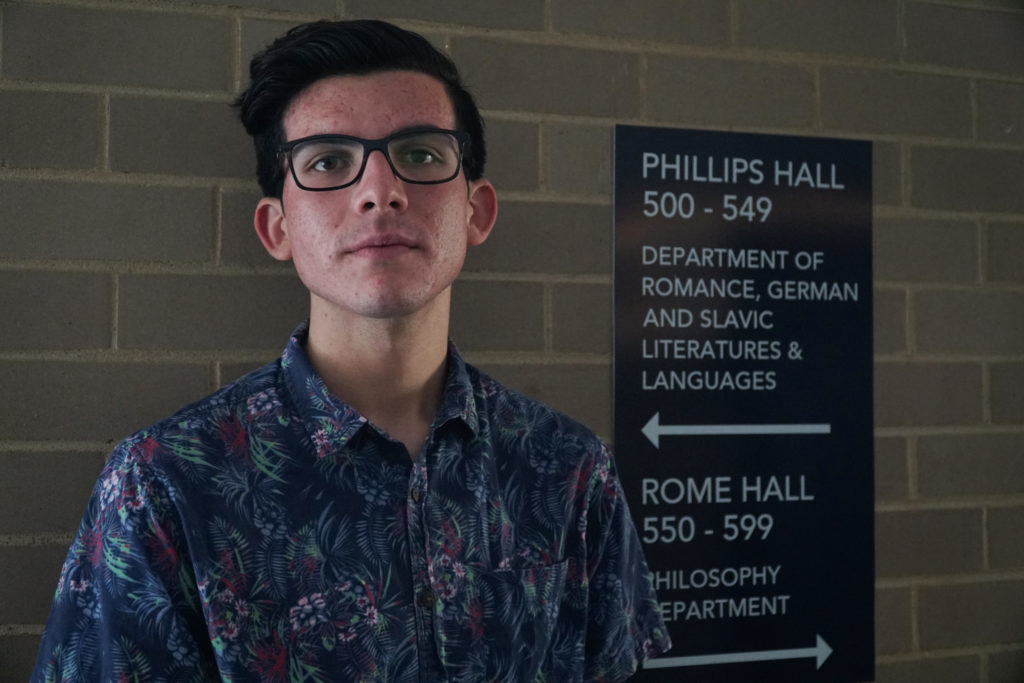More than 100 students have signed a petition aimed to prevent the language department from dropping three advanced-level Spanish language courses next semester.
Officials in the Department of Romance, German and Slavic Languages and Literatures are considering permanently canceling three 3000-level Spanish classes available for students pursuing a major or minor in the language, according to the petition. Students said the proposed change will eliminate their ability to take advanced Spanish language coursework that focuses specifically on verbal communication skills.
The petition has more than 110 signatures as of Sunday.
“Without these options to engage in Spanish communication, students will be required to take exclusively literature-focused classes for their upper-level requirements,” the petition states.
Antonio López, the interim chair of the department, declined to comment on any potential changes to the department’s course offerings, saying it is “premature” to answer specific questions while discussions are “ongoing.”
“Discussions about curriculum are a normal part of an ongoing academic review process to ensure that we are meeting the academic needs of our students,” he said in an email.
Sophomore Will Hoadley-Brill, who drafted the petition and is majoring in Spanish and peace studies, said the courses that department faculty are considering discontinuing are Advanced Spanish Writing, Advanced Spanish Service Learning and Advanced Oral Proficiency: Environmental and Social Sustainability in Latin America.
The three courses, along with Bilingualism in the Spanish-Speaking World, are the only four advanced Spanish language courses above the 2000-level that the Spanish language program currently offers. The program includes 12 courses, according to the department’s website.
Hoadley-Brill, who took one of the three courses last semester and is taking one currently, said he took the classes because of his interest in their subjects and their ability to improve his comprehension of the language, which inspired him to draft the petition.
“These courses have been the most applicable, the most educational, the most helpful courses I have taken at GW,” he said.
Hoadley-Brill said department faculty should not remove the classes because the professors teaching these courses impart students with a better understanding of language by teaching them about the language in “spoken contexts.”
The three courses are intended to teach students how to write about Spanish culture, how to discuss sustainability in Latin America and how to speak and write about social change and civic engagement, according to the University bulletin.
Two of the three courses, Advanced Spanish Writing and Advanced Oral Proficiency, are being offered this semester, taught by Victor Valdivia Ruiz, an assistant professor of Spanish, and Maria Jose de la Fuente, a professor of Spanish, respectively, according to the schedule of classes.
Valdivia Ruiz and Jose de la Fuente declined to comment. Five other faculty members in the department declined to comment, and 10 professors did not return a request for comment.
Hoadley-Brill said he was told the courses would be cut to increase enrollment in advanced Spanish literature courses. The Spanish literature program consists of about 30 courses like Theater of Spain and Latin America and Medieval Spanish Literature.
He said the plan will not be effective because reducing the variety of courses available to students studying Spanish will decrease overall interest in taking any Spanish language or Spanish literature courses.
“Enrollment numbers in these courses is not low,” Hoadley-Brill said. “These courses are full of students who want to take these courses. The petition, I think, shows that there’s a want, there’s a need.”
He said he arranged a meeting through email with López, the department chair, next week to discuss the proposed changes and student reactions to them. He said he hopes to expand his understanding of why the department might abolish the courses.
Hoadley-Brill said he wants to “show the chair that this is a decision that is widely not approved by students” at the meeting.
He said he has been meeting with faculty and staff members who he knew would be affected by the changes since he first heard about the proposal. Hoadley-Brill added that faculty have expressed interest in supporting his cause through writing letters and sharing their “discontent” with the chair.
He declined to say how he heard about the change.
Senior Jocelyn Buckley, an international affairs major and one of the petition’s signers, said the classes that may be cut from the department have helped her understanding of the language because she is able to practice the language in a “natural setting” – discussing topics like sustainability and service in the Spanish-speaking world.
“In my experience at GW, I’ve learned Spanish better in an environment in which we’re encouraged to speak,” she said.
Lily Caswell, a sophomore majoring in international business and marketing and another one of the petition’s signers, said she found a sense of community among her classmates and professor in the course on sustainability in Latin America.
“There’s no course that lets you into the community to interact with other people from Latin America or those with Hispanic backgrounds,” she said.
She said that if administrators implement the proposed changes, the department would be doing a “disservice” to students in learning every aspect of the Spanish language.
“It’s just better in my opinion to offer a holistic view, whereas I feel like if they revoked these certain classes, then you’re really limiting kids to just the reading, literature aspect of Spanish, which, in my opinion, is such a fraction of what it has to offer,” she said.
Caswell currently plans on minoring in Spanish but said she would switch to a sustainability minor if the changes go through because she is not interested in the other courses the department offers that would count toward the minor.
“Personally, I think I am a prime example of what could happen,” she said. “Obviously, it’s very deterring to someone who really wants to focus on their speaking rather than their reading ability. I think that also is going to deter people from the Spanish department in general.”







